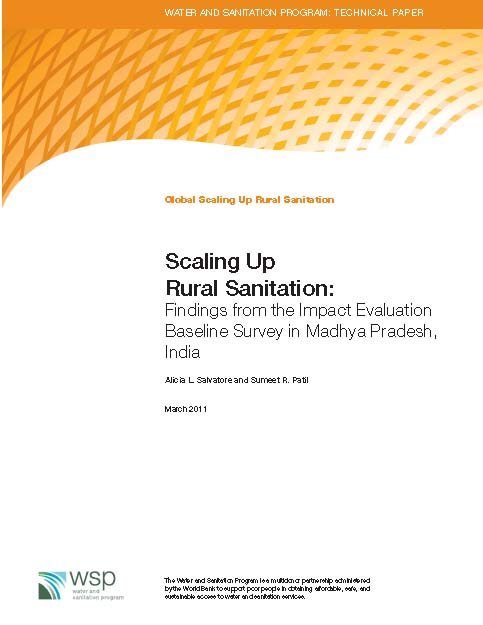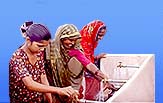/topics/government-programmes
Government Programmes
National Green Tribunal (NGT) – Relevant notifications from the Ministry of Environment and Forests
Posted on 22 Apr, 2011 05:16 PMIrrigation system operation practices - A handbook by Central Water Commission (1990)
Posted on 21 Apr, 2011 10:36 PMFor increasing agricultural productivity from existing irrigation systems, improved operation of the systems coupled with timely maintenance of the systems has a major role to play.
Drinking water quality monitoring and development of surveillance mechanisms - A pilot study done by NEERI in New Delhi
Posted on 20 Apr, 2011 02:30 AMThe WHO guidelines for drinking water quality aim to protect public health and the key way to ensure this is through the adoption of Water Safety Plans (WSP). WSP includes setting of health targets, risk analysis and its assessment to identify priority hazardous scenarios and management of the risk.
Resistance against the Polavaram dam - An EPW article
Posted on 19 Apr, 2011 11:02 PM
This EPW paper studies the various forms of resistance against the construction of Polavaram dam, and notes that the main feature of the struggles has been the involvement of people’s organisations due to the failure of traditional as well as statutory bodies, representatives and regional leadership of mainstream political parties.
Dam cost Rs. 1 crore but village in Dantewada, Chattisgarh depends on dying hand pump ! - An audio update from CGNet Swara
Posted on 18 Apr, 2011 01:28 PMHe gives example of a village near Dantewada where Public Health department has made a check dam spending Rs 1 crore.
Scaling up rural sanitation: Findings from the impact evaluation baseline survey in Madhya Pradesh – A report by the Water and Sanitation Program of the World Bank
Posted on 18 Apr, 2011 08:20 AM This report by the Water and Sanitation Program (WSP) of the World Bank presents the findings of the baseline and community survey conducted in two districts of Madhya Pradesh (MP) - Dhar and Khargone. The goal of the program is to reduce the risk of diarrhea and therefore increase household productivity by stimulating demand for sanitation in the lives of people. The program also seeks to stimulate the supply of appropriate sanitation program and services by conducting market research and training local artisans to build the relevant facilities.
This report by the Water and Sanitation Program (WSP) of the World Bank presents the findings of the baseline and community survey conducted in two districts of Madhya Pradesh (MP) - Dhar and Khargone. The goal of the program is to reduce the risk of diarrhea and therefore increase household productivity by stimulating demand for sanitation in the lives of people. The program also seeks to stimulate the supply of appropriate sanitation program and services by conducting market research and training local artisans to build the relevant facilities.
In India, the program is supporting the Government of India’s (GoI) Total Sanitation Campaign (TSC) in two States: Himachal Pradesh and Madhya Pradesh. The main components of the intervention include: Community-Led Total Sanitation (CLTS), Social Marketing of Sanitation, Strengthening the Enabling Environment and Nirmal Gram Puraskar (NGP) Awards.
Paddy and water management with the System of Rice Intensification (SRI) – A special issue of the journal "Paddy and Water Environment"
Posted on 17 Apr, 2011 10:30 AM This brings together the results of formal research on SRI in a number of countries (Part I) and also reports on initiatives by government agencies, NGOs, universities, or the private sector, bringing knowledge of SRI to farmers in a wide range of agroecological circumstances (Part II). It has six articles and nine technical reports from Afghanistan, China, the Gambia, Kenya, India, Indonesia, Iraq, Mali, Pakistan, Panama, and Thailand as well as several review articles.
This brings together the results of formal research on SRI in a number of countries (Part I) and also reports on initiatives by government agencies, NGOs, universities, or the private sector, bringing knowledge of SRI to farmers in a wide range of agroecological circumstances (Part II). It has six articles and nine technical reports from Afghanistan, China, the Gambia, Kenya, India, Indonesia, Iraq, Mali, Pakistan, Panama, and Thailand as well as several review articles.
The System of Rice Intensification (SRI), developed in Madagascar almost 30 years ago, modifies certain practices for managing plants, soil, water, and nutrients with the effect of raising the productivity of the land, labor, and capital devoted to rice production. Certain production inputs are reduced—seeds, inorganic fertilizer, water, and fuel where water is pumped—with increased yield as a result.
Operation and maintenance for rural water supplies – A manual by Department of Drinking Water and Sanitation and the Water and Sanitation Program of World Bank
Posted on 17 Apr, 2011 07:23 AM This Operation and Maintenance (O&M) manual for rural water supplies by the Department of Drinking Water And Sanitation and Water and Sanitation Program of the World Bank complements their Gram Panchayat Handbook released in 2010 . It takes into account the current aspirations and challenges facing the sector, and builds on the framework already set out in the National Rajiv Gandhi Drinking Water Programme (NRDWP) and Strategic Plan 2011-2022.
This Operation and Maintenance (O&M) manual for rural water supplies by the Department of Drinking Water And Sanitation and Water and Sanitation Program of the World Bank complements their Gram Panchayat Handbook released in 2010 . It takes into account the current aspirations and challenges facing the sector, and builds on the framework already set out in the National Rajiv Gandhi Drinking Water Programme (NRDWP) and Strategic Plan 2011-2022.
Transparent & participatory governance in functioning of the decision-making committees on water resources
Posted on 16 Apr, 2011 03:46 PMTo
Shri Salman Khurshid,
Union Minister of Water Resources,
Shramshakti Bhawan,
Rafi Marg,
New Delhi - 110001
2. Secretary, Union Ministry of Water Resources
3. Chairman, Central Water Commission
4. Deputy Chairman, Planning Commission
5. Member (Water), Planning Commission
6. Ms Aruna Roy, Chairperson, Working Group on Transparency, Accountability, Governance at National Advisory Council
SRI sammans for 2010-11 awarded to 35 farmers at symposium organised by Pragati in Koraput, Orissa - A report
Posted on 16 Apr, 2011 03:37 PMThese farmers were rewarded for successfully increasing the production of paddy using SRI in different parts of Koraput district.





